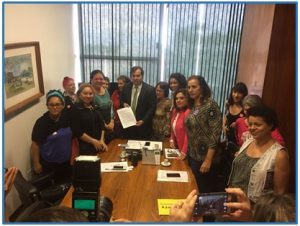
by the Abortion Frontline Project, coordinated by Cfemea (Feminist Center for Studies and Advisory), Ipas Brazil and Sexuality Policy Watch
As the turbulence of Brazil’s political climate and sexual politics overall continues, the abortion rights debates decidedly intensified in November 2017 (check here for updates in Portuguese). As reported by the International Campaign for Women’s Right to Safe Abortion on 24 November, Amendment No.181, a provision aimed at including right to life from conception into the Constitution, was approved by a Special Commission of the Chamber of Deputies on 8 November. Then, during the debate on the measure, new amendments to the provisional text were presented and were to be voted finally on 12 December. Congresswoman Erika Kokay, whose vote against the amendment was the only one, had proposed on the 8th to withdraw this “Trojan Horse” provision (the right to life from conception) because it was inserted into the text of what was supposed to be a bill for extending maternity leave for women who deliver prematurely.
Alongside these events, a relentless feminist campaign developed and began to have an influence on the vote. Street protests took place in a range of cities across the country on 13 November and once again on the 25th of November, the first day of the International 16 Days against Gender-Based Violence. On 4 December, on the eve of the day in which the text was definitely supposed to be voted on by the Special Committee, over 10,000 people attended a vigil in São Paulo. In addition, other efforts converged: a national petition had been initiated and had already obtained more than 173.000 supporters and a number of letters condemning PEC 181 have been sent to the Congressional authorities. These included a Joint Note from UN agencies, a letter from the European Parliamentary Forum, an international letter of solidarity signed by 390 people who attended the Special Meeting of the Presiding Officers of the Regional Conference on Population and Development in Latin America and the Caribbean, in Santiago Chile on 9 November 2017, and an Amnesty International Feminist Alert containing 40,000 signatures.
An important strategy was the strong pressure put on key legislators, in particular the President of the House, Rodrigo Maia, whose aim has been to stall the process. These efforts have been successful, at least for the time being. On 5 December, gathered in a meeting with President Maia, representatives of the National Front against the Criminalization of Women and for the Legalization of Abortion delivered a letter containing 400 signatures from individual women and 142 signatures from organizations opposing the total criminalization of abortion (read the letter).

The President of the House quite surprisingly stated that the amendment was not tabled in order to be passed by the House. Rather, he said, the purpose of the amendment on the right to life from conception was merely aimed at countering the opinion on the decriminalization of abortion issued by one of the benches of the Supreme Court in November 2016, because the block of conservative Representatives of the House considered that the Supreme Court could not legislate on these matters. In that regard, it is worth recalling that the opinion put forward by the Court at that time inspired the PSOL (Socialism and Freedom Party) and ANIS – Instituto Feminista de Bioética to present, in March 2017, a petition to the Court demanding recognition of the anti-constitutionality of the criminalization of abortion, popularly know in Brazil as ADPF 442.
And, indeed, while the intense Congressional processes described above evolved, the abortion rights debate has further heated up on the judiciary frontlines too. A ground-breaking case was also presented to the Supreme Court in late November 2017, when Rebeca Mendes, a 30-year-old black woman who is the single mother of two children and a law student (who has a public scholarship reserved for black Brazilians) approached ANIS in search of help. She found herself pregnant from unplanned sexual relations with her ex-partner, at a moment when she was changing contraceptive methods. She told ANIS she wanted to terminate the pregnancy for economic reasons and also because she wanted to complete her academic course. But she did not want to risk an illegal procedure. In response to her claim, ANIS and PSOL used the arguments developed in ADPF 442 to petition the Court to authorize Rebeca to access a medical abortion procedure. When the petition to the Court was made public, a campaign in support of Rebeca’s demand was launched #ForRebeca’sLife that quickly gathered enormous support. At the same time, however, Rebeca was also harassed and threatened by anti-abortion forces.

On 28 November, Judge Rosa Weber under whom ADPF 442 is being considered, denied her request two days later, based on a technical issue: that the abstract juridical nature of the original petition does not allow for an individual claim to be added to it. As a result, a Habeas Corpus was presented to a lower court in São Paulo, where Rebeca lives, but a response was not immediately forthcoming.
Under these very tense conditions, Rebeca began experiencing severe psychological stress and was invited by CLACAI (Latin American Consortium against Unsafe Abortion) to present her case at their meeting in Bogota, Colombia. After she arrived, she was also offered access to a safe and legal termination. In Colombia, since 2006, thanks to a Constitutional Court decision, the preservation of a woman’s physical and mental health is a recognized ground for abortion in Colombia. The procedure was safely performed and Rebeca returned to Brazil on 9 December. The mainstream press interviewed her and the case was extensively reported in both major newspapers and on social media (see a compilation of these reports in Portuguese).

On 11 December, she told ABC News in an interview: “I didn’t want to die. I would be suffering my worst fears: either to die at home and not be able to raise my children or be arrested and also not be able to raise my children. There was no way out.”
On Sunday, 10 December, International Human Rights Day, 172 women – including a number of academic and performing art personalities – spoke up publicly in support of Rebeca and declared that they too have had abortions. The initiative was inspired by the “Manifeste des 343 sans salope”, launched in France on 5 April 1971, as part of the national campaign for abortion rights, which was signed amongst others by Simone de Beauvoir. But it also resonates with the 1983 and 1997 cover articles of some of the main Brazilian weekly magazines, in which a number of female celebrities and personalities also declared that they had undergone illegal abortions.

The next scenes in this battle for women’s right to abortion in Brazil are as follows: the amendment was scheduled to be voted on on 12 December, in the Special Commission. Then it was delayed until today (13 December) and as we write this report, the Special Commission has met, and amid a tense climate of protest inside the House on the amendment, the vote was suspended until tomorrow. Although the hopes are that the amendment will only have its final vote next year, the resistance has not stopped.
Some Congressmen have used every rule in the rulebook in order to continue debating the bill, without giving up the language of “right to life from conception”, which is causing a battle and delaying support for the intended benefits in the original amendment, that is, longer maternity leave for pregnant women with premature infants. At the same time as the Special Commission was meeting, the Congressional Commission in Defense of Women’s Rights also came together today (13 December) in a public meeting to debate the question of the number of women who have died due to unsafe abortion procedures. In contrast to the speeches from the anti-abortion side, expressing both their religious beliefs and their doubts about the high number of women’s deaths from unsafe abortions, members of the National Front against the Criminalization of Women and for the Legalization of Abortion were able to present accurate data and information in reports by Olímpio Moraes (Doctor and University Professor at the Federal University of Pernambuco) and Tânia Lago (Public Health Doctor). In response to these data, anti-abortion Congressman Diego Garcia announced he would collect signatures calling for an investigation of abortion data, threatening the Ministry of Health’s data collection to monitor maternal mortality.
In response to this threat, an official letter from the State Council of Mato Grosso do Sul was published on the Congress website, linked to the processing of the Amendment on 13 December. In the letter, State Councilmen urged the members of the Special Commission to withdraw the language calling for an abortion ban, arguing that such a ban would mean an immense setback for and risk to women. In support of this letter, the Mato Grosso do Sul Public Defender’s Office and the Women’s Rights State Council also launched a manifesto against the amendment.
We continue the resistance!



